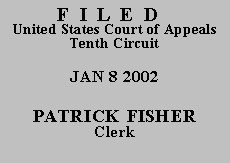

| ARNOLD S. BARRIENTOS, |
|
Mr. Barrientos was convicted in Oklahoma state court after entering a guilty plea. In his federal habeas petition, he claims that he was improperly sentenced under a criminal statute different from the one to which he pleaded guilty. The matter was referred to a magistrate judge, who recommended that the petition be dismissed as time-barred under the one-year limitation provision of Antiterrorism and Effective Death Penalty Act of 1996 (AEDPA), 28 U.S.C. § 2244(d). The federal district court adopted the magistrate's recommendation in its entirety and dismissed the petition.
Mr. Barrientos entered a plea of guilty and was convicted on July 7, 1998. Under Rule 4.2 of the Rules of the Oklahoma Court of Criminal Appeals, he had ten days from the time of conviction to file an application to withdraw his guilty plea. Because he did not file such an application or otherwise appeal the conviction, his conviction became final on July 17, 1998, ten days after judgment and sentencing.
The AEDPA applies a one-year limitation period from the date of final conviction. 28 U.S.C. § 2244(d). The limitation is tolled during the time that a properly-filed application for state post-conviction relief is pending. 28 U.S.C. § 2244(d)(2). Mr. Barrientos filed an application with the state district court for post-conviction relief on April 7, 1999, thereby tolling the one-year limitation with 102 days remaining. Tolling continued until the application was denied, and during the thirty days after denial when Mr. Barrientos could have, but did not, appeal that judgment. Tolling therefore ended July 25, 1999. On November 4, 1999, 102 days later, the statute of limitations for Mr. Barrientos's habeas appeal expired. A second application for state post-conviction relief, filed on July 3, 2000 did not toll the limitations period because it was filed after the AEDPA's one-year limitation period expired. Mr. Barrientos's habeas petition, filed on December 20, 2000, is therefore time-barred under § 2244(d)(1).
Petitioner claims that lack of access to legal materials from August 6, 1998 through January 21, 2000, precluded timely filing for state post-conviction relief and this state-created impediment violated his constitutional right of access to the courts. See Lewis v. Casey, 518 U.S. 343, 346 (1996). However, Mr. Barrientos requested modification of his state court sentence before the district court on September 3, 1998, and he filed his first application for post-conviction relief on April 7, 1999, two events that cast doubt on his claim that he lacked access to the courts. Furthermore, allegations that the law library was inadequate, without more, do not toll the statute of limitations. Miller v. Marr, 141 F.3d 976, 978 (10th Cir. 1998).
The AEDPA's one-year period of limitation is subject to equitable tolling in extraordinary circumstances. Miller, 141 F.3d at 978. The one-year period may be equitably tolled "when a prisoner is actually innocent, when an adversary's conduct or other uncontrollable circumstances prevents a prisoner from timely filing, or when a prisoner actively pursues judicial remedies but files a defective pleading during the statutory period." Gibson v. Klinger, 232 F.3d 799, 808 (10th Cir. 2000) (citations omitted). Mr. Barrientos fails to demonstrate any of the prerequisites to support equitable tolling. Miller, 141 F.3d at 978. He has not alleged any facts or offered any evidence of the steps he took, the lengths he went to, or the diligence he otherwise exercised during the time he claims deprivation of access to legal materials. Indeed, even after Mr. Barrientos was afforded access to adequate legal materials, he waited six months before filing his claim.
We DENY a COA; DENY IFP status, and DISMISS the appeal.
Entered for the Court
Paul J. Kelly, Jr.
Circuit Judge
*. This order and judgment is not binding precedent, except under the doctrines of law of the case, res judicata, and collateral estoppel. This court generally disfavors the citation of orders and judgments; nevertheless, an order and judgment may be cited under the terms and conditions of 10th Cir. R. 36.3.
2. After examining the briefs and the appellate record, this three-judge panel has determined unanimously that oral argument would not be of material assistance in the determination of this appeal. See Fed. R. App. P. 34(a); 10th Cir. R. 34.1(G). The cause is therefore ordered submitted without oral argument.